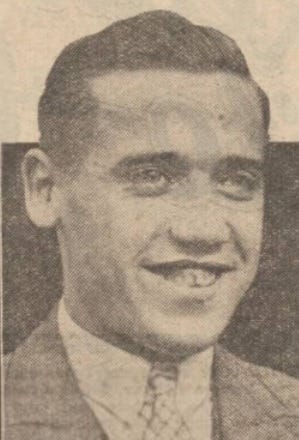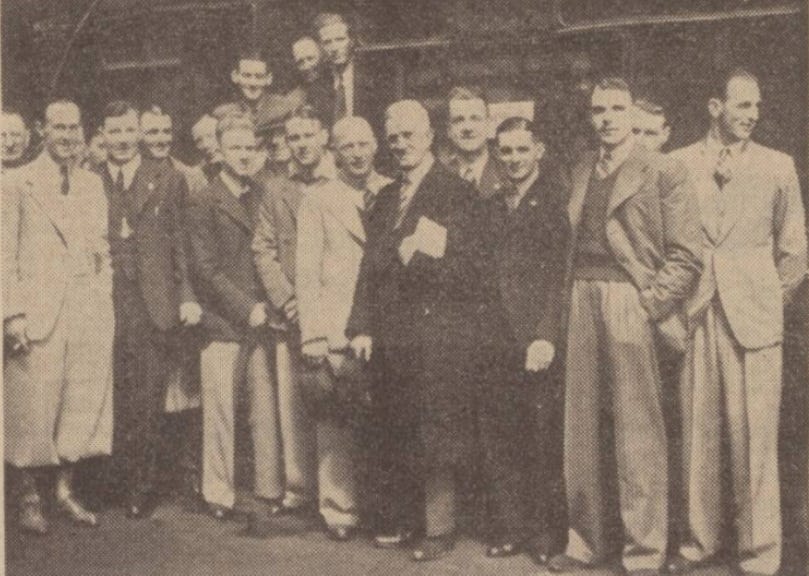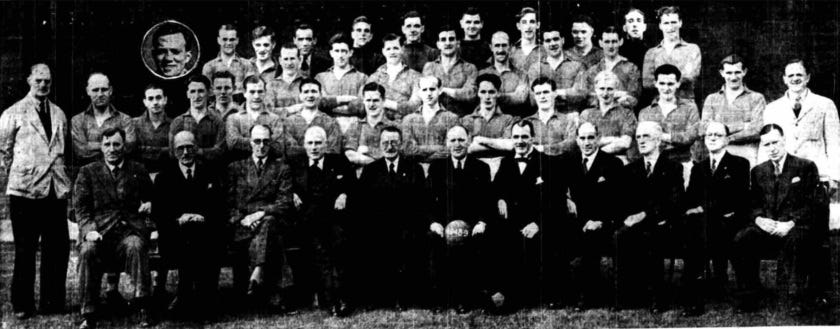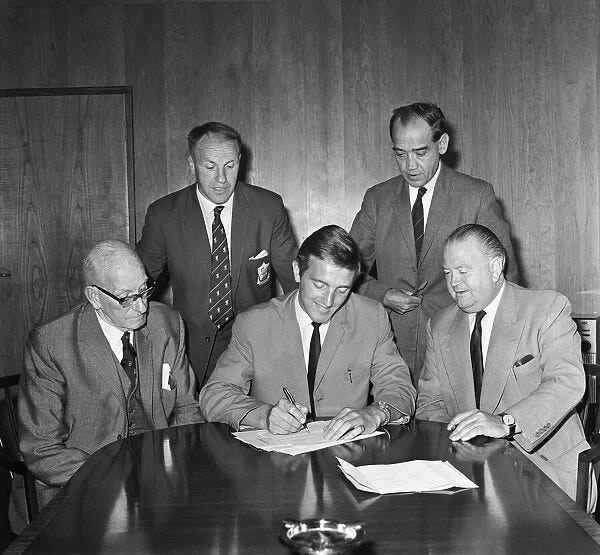📖 Anfield Annals: Jimmy McInnes; Liverpool defender to club secretary to suicide on the Kop
An Anfield career stunted by war and ended in the most upsetting of circumstances in an age before mental health awareness
Much like any player hitting their prime during the early 1940s, Jimmy McInnes’ career was cruelly curtailed because of the Second World War but fortunately for him and Liverpool - their relationship was set to be rekindled.
The departure of left-half Jimmy McDougall left the Reds with a big hole to fill in their defence and after attempting to play both future Anfield boss Phil Taylor and Manchester United manager Matt Busby in the vacant spot, it was clear a new option was needed.
It was soon decided that McInnes from Third Lanark in Scotland was the man for the job. With it also being agreed in his contract that his university studies could be moved from Glasgow to Liverpool and so after arriving in March of 1938, the defender slotted in with ease.
The Scot paved the way for the likes of Kevin Keegan, Robbie Fowler and Virgil van Dijk by scoring on his debut, making an instant impact on George Kay’s side. The Daily Mail reported: ‘The new Scottish half-back, McInnes, was not a sensation, but in his quiet play was coolness, method, and very sound positioning... Afterwards Balmer got a fine goal, and McInnes a lucky one which should have been saved’.
Without being a debut for the ages, the 26-year-old had made an impact that was strong enough to maintain the left-half role for the rest of the season that saw the Reds finish 11th in the First Division. Playing 34 of the 42 fixtures in the 1938/39 campaign, with a broken foot being the only interruption to his performances, shows how important Jimmy became for George Kay.
Standing at 5ft 9in. the Scot had arrived for a rather sizeable £5,000 and his durability was certainly value for money. In what was a rather uninspiring period of being a fan at Anfield, nobody was aware as to how much their lives were to be turned upside down when the 1939/40 season began.
The first game of the new campaign was away to Sheffield United and saw the Reds fall to a 2-1 defeat. However, it also brought with it Jimmy’s second and final goal for the club. The following match at Anfield was preceded by the news that 20 members of the first-team squad had been called up to partake in the war effort.
The day before war was declared, the Reds beat Chelsea 1-0 and McInnes unknowingly made his final competitive appearance at the age of 27. What makes this almost crueller is that the three games that were played this season have been wiped from the records, meaning Jimmy’s second goal for the club doesn’t officially count either.
What followed was a period of footballing insignificance but appearances for Liverpool and a host of other clubs, including Brighton, Newcastle and Manchester United, in wartime matches are also not considered as ‘official’ games. Not to brush over the events of what happened during the Second World War but, from a purely football outlook, this ended Jimmy’s senior playing days by the time peace returned in September 1945.
The Football League agreed to several benefit matches for players whose livelihoods were lost because of the war and this was offered to Liverpool’s Bill Kinghorn, Berry Nieuwenhuys, John Shafto and Jimmy McInnes, in April 1945. The club also made an effort to look after these players, and despite not making a first-team appearance in the First Division again, Jimmy’s playing days continued in the Reserves and friendlies before football fully returned for the 1946/47 season.
A transition from playing staff to A team coach occurred in 1948, and through to 1955, he proved himself as a talented manager, scout and secretary. When a club meeting occurred, special attention was made to the contributions of the Scot who had: ‘done a magnificent job under difficult circumstances. Nobody could possibly have done better’. After initially holding the role of club secretary on a temporary basis after the sudden and untimely death of John Charles Rouse, the position was now a full-time job and McInnes had successfully worked his way up to being a crucial member of the Anfield hierarchy.
Seeing as they had convinced Jimmy to abandon his studies and concentrate on a career in football, perhaps the club felt a debt was owed to the former defender and his place at a now Second Division Liverpool FC was secure. McInnes and the rest of the boardroom were not expecting what was to follow in the next 10 years though.
Several more seasons of mediocrity and failed promotion pushes led to the appointment of Bill Shankly in 1959 and things turned around quickly. By 1962 promotion was secured and within three years, the Reds had won the First Division, a club-first FA Cup and in May of 1965 – Anfield hosted a European Cup semi-final.
This era is undoubtedly one of the most exciting for any fan of the club but it seems that the rapidly increasing importance of matches and responsibilities bled into the boardroom, specifically on the lap of the secretary. Less than 24 hours after watching the Reds claim a famous victory over Inter Milan, it seems everything got too much for the Scot.
As reported by the Daily Express: ‘Jimmy McInnes, secretary of Liverpool Football Club was found hanged in a turnstile booth at Anfield, the club ground last night.
‘He was discovered by an inspector making a routine check near the Kop, the huge “popular” stand. Senior detectives spent three hours at the ground last night. An inquest will be held today.
‘While the police inquiries were going on the club directors were called from their homes for a hurried meeting in the club board room.
‘On Sunday, when he returned triumphantly with his team to Liverpool from Wembley after winning the F.A. Cup last Saturday, Jimmy McInnes was in a jubilant mood.
‘I travelled with 53-year-old Jimmy for part of the journey. He could talk only of the club’s success. He showed no signs of strain.
‘All yesterday he was in his office organising Liverpool’s journey to Milan next Monday, in preparation for their game in the second leg against Milan on Wednesday.
‘He spent most of his working life with the club. First as a player and then on the office side’.
It was a tragic show of how committed Jimmy was to carrying out his duties, up to the final seconds of his life. After helping organise a trip to Wembley, watching Shankly’s side win the FA Cup and one of the greatest days Anfield has seen in the European Cup semi-final – it was clear that the role had affected the mental health of a man who should have been relishing the chance to be involved.
In an age of not being encouraged to speak out and seek help, a ‘put up and shut up’ attitude no doubt led to the tragic events inside the Kop. The man nicknamed ‘Soapy’ helped turn the fortunes of the Reds around and his role should forever be remembered as a warning of the importance of speaking out about mental health and for the brilliant job he did.
A truly unique story from the annals of Anfield history.
If you’re of fan of this kind of content, all completely ad-free, then feel free to hit the subscribe button below and become an EOTK Insider. Dig into exclusive tidbits reserved only for our subscribers!











Fantastic article Pete, brilliantly written and hugely informative
A sad loss to a man dedicated to the club.